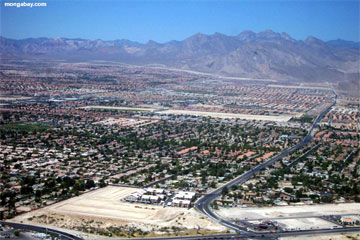Is global drying a higher priority than global warming?
Nestle Chairman: Biofuels are “ethically indefensible”
mongabay.com
June 14, 2008
The emergence and expansion of biofuels produced from food crops has exacerabted world’s agriculture and water crisis and is a bigger short-term threat than global warming, argued Peter Brabeck-Letmathe in an editorial published Thursday in the Wall Street Journal Asia.
“Food prices are rising, in large part because agriculture suppliers can barely keep up with today’s demand. So what is the world doing? Reorienting land away from food production and toward plants cultivated for energy needs,” wrote Brabeck-Letmathe, chairman of the food giant Nestlé.
“This could be the single most destructive set of policy mistakes made in a generation. From time immemorial, mankind has struggled to produce enough food. Wars have been fought over arable land. Whole populations have been forced to migrate, and untold millions of human beings have died because circumstances, climate, war or political ineptitude have deprived them of what the German language describes as ‘Lebensmittel,’ or a ‘means for survival.’ This problem hasn’t disappeared; our world today needs to feed some six billion people. According to some projections, that number will rise to nine billion by 2050.”
 Leading climate models suggest that warmer temperatures will increase water scarcity in many parts of the world. |
Brabeck-Letmathe said that efforts to fight climate change using biofuels have worsened the global food crisis and are contributing to water shortages.
“The production of biofuels has stimulated a massive, and destructive, reorientation of the world’s agriculture markets. The U.S. Department of Energy calculates that every 10,000 liters of water produces as little as five liters of ethanol, or one to two liters of biodiesel. Biofuels are economical nonsense, ecologically useless and ethically indefensible.”
He said that efforts to encourage responsible use of water through competitive pricing should be prioritized over initiatives to slow global warming.
“Water is being wasted and misused because few people are even aware of its worth. Today, 94% of available water is used by agriculture — and because there are no cost consequences for the farmer, almost all of that water is underused or misused,” he wrote. “The same is true for water used in industry and for household purposes. If the cost of infrastructure is not covered, the degradation of municipal water distribution will continue. Water for basic needs should of course remain free. But there is no need whatsoever to subsidize water to wash a car, fill a swimming pool or maintain a golf course.
“Right now, the urgent issue is water, not global warming, and we cannot afford to ignore it any longer,” he concluded.
Peter Brabeck-Letmathe. Global Drying. Wall Street Journal Asia, June 13, 2008; Page A13














